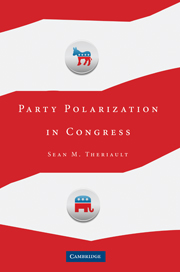PART II - CONSTITUENCY CHANGE
Published online by Cambridge University Press: 05 September 2012
Summary
Part II of this book examines the connection between the increasing partisanship of members' constituencies and the growing divide between the parties on Capitol Hill (arrows A, B, C, and D of figure 3.2). Redistricting, ideological sorting, and geographic sorting provided the initial jolt and the extremism of party activists provide the sustaining power that directly – and then indirectly, through the legislative process – polarized the political parties in Congress.
Figure P.1 shows the conceptual difference among the districting-based explanations for party polarization. Consider a state with twelve residents and four congressional districts. In the initial district lines, the state has two districts with one Republican and two Democrats (Districts 2 and 4) and two districts with two Republicans and one Democrat (Districts 1 and 3). In each of these four districts, a moderate member is likely to be elected. In panel A, the state goes through redistricting after a census. The state legislators decide to protect their incumbents by getting rid of partisan dissent in each of the districts, such that all four districts now contain partisan homogeneity. By the end of the decade, we would not be surprised to see two conservative Republicans replace the two moderate Republicans and two liberal Democrats replace the two moderate Democrats. In each of these districts, the incumbent is vulnerable only in a primary.
- Type
- Chapter
- Information
- Party Polarization in Congress , pp. 59 - 61Publisher: Cambridge University PressPrint publication year: 2008



